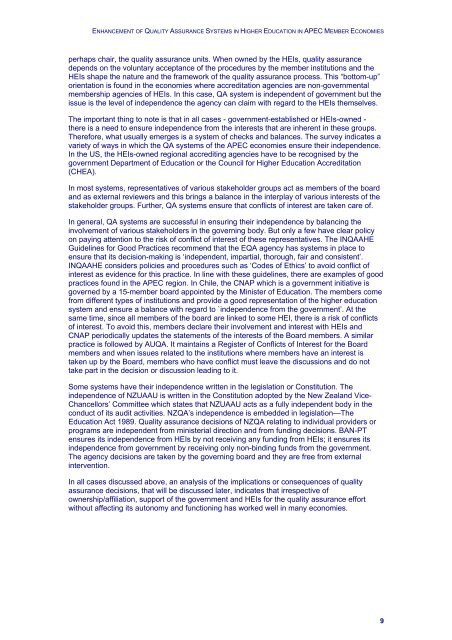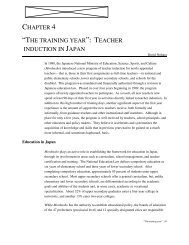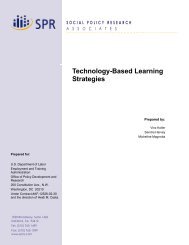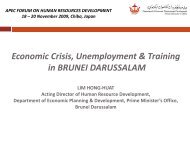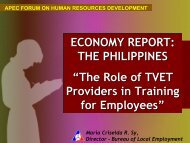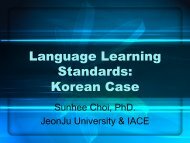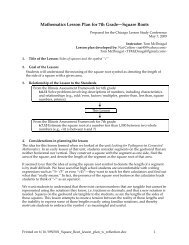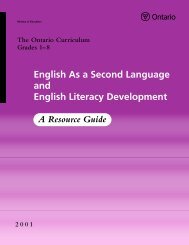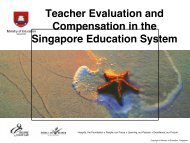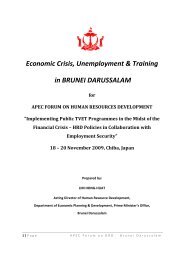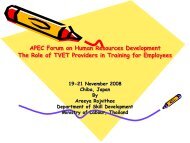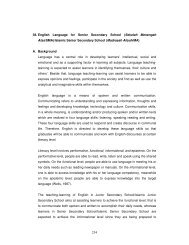Quality Assurance Systems in Asia-Pacific Economic Cooperation
Quality Assurance Systems in Asia-Pacific Economic Cooperation
Quality Assurance Systems in Asia-Pacific Economic Cooperation
You also want an ePaper? Increase the reach of your titles
YUMPU automatically turns print PDFs into web optimized ePapers that Google loves.
ENHANCEMENT OF QUALITY ASSURANCE SYSTEMS IN HIGHER EDUCATION IN APEC MEMBER ECONOMIES<br />
perhaps chair, the quality assurance units. When owned by the HEIs, quality assurance<br />
depends on the voluntary acceptance of the procedures by the member <strong>in</strong>stitutions and the<br />
HEIs shape the nature and the framework of the quality assurance process. This “bottom-up”<br />
orientation is found <strong>in</strong> the economies where accreditation agencies are non-governmental<br />
membership agencies of HEIs. In this case, QA system is <strong>in</strong>dependent of government but the<br />
issue is the level of <strong>in</strong>dependence the agency can claim with regard to the HEIs themselves.<br />
The important th<strong>in</strong>g to note is that <strong>in</strong> all cases - government-established or HEIs-owned -<br />
there is a need to ensure <strong>in</strong>dependence from the <strong>in</strong>terests that are <strong>in</strong>herent <strong>in</strong> these groups.<br />
Therefore, what usually emerges is a system of checks and balances. The survey <strong>in</strong>dicates a<br />
variety of ways <strong>in</strong> which the QA systems of the APEC economies ensure their <strong>in</strong>dependence.<br />
In the US, the HEIs-owned regional accredit<strong>in</strong>g agencies have to be recognised by the<br />
government Department of Education or the Council for Higher Education Accreditation<br />
(CHEA).<br />
In most systems, representatives of various stakeholder groups act as members of the board<br />
and as external reviewers and this br<strong>in</strong>gs a balance <strong>in</strong> the <strong>in</strong>terplay of various <strong>in</strong>terests of the<br />
stakeholder groups. Further, QA systems ensure that conflicts of <strong>in</strong>terest are taken care of.<br />
In general, QA systems are successful <strong>in</strong> ensur<strong>in</strong>g their <strong>in</strong>dependence by balanc<strong>in</strong>g the<br />
<strong>in</strong>volvement of various stakeholders <strong>in</strong> the govern<strong>in</strong>g body. But only a few have clear policy<br />
on pay<strong>in</strong>g attention to the risk of conflict of <strong>in</strong>terest of these representatives. The INQAAHE<br />
Guidel<strong>in</strong>es for Good Practices recommend that the EQA agency has systems <strong>in</strong> place to<br />
ensure that its decision-mak<strong>in</strong>g is ‘<strong>in</strong>dependent, impartial, thorough, fair and consistent’.<br />
INQAAHE considers policies and procedures such as ‘Codes of Ethics’ to avoid conflict of<br />
<strong>in</strong>terest as evidence for this practice. In l<strong>in</strong>e with these guidel<strong>in</strong>es, there are examples of good<br />
practices found <strong>in</strong> the APEC region. In Chile, the CNAP which is a government <strong>in</strong>itiative is<br />
governed by a 15-member board appo<strong>in</strong>ted by the M<strong>in</strong>ister of Education. The members come<br />
from different types of <strong>in</strong>stitutions and provide a good representation of the higher education<br />
system and ensure a balance with regard to `<strong>in</strong>dependence from the government’. At the<br />
same time, s<strong>in</strong>ce all members of the board are l<strong>in</strong>ked to some HEI, there is a risk of conflicts<br />
of <strong>in</strong>terest. To avoid this, members declare their <strong>in</strong>volvement and <strong>in</strong>terest with HEIs and<br />
CNAP periodically updates the statements of the <strong>in</strong>terests of the Board members. A similar<br />
practice is followed by AUQA. It ma<strong>in</strong>ta<strong>in</strong>s a Register of Conflicts of Interest for the Board<br />
members and when issues related to the <strong>in</strong>stitutions where members have an <strong>in</strong>terest is<br />
taken up by the Board, members who have conflict must leave the discussions and do not<br />
take part <strong>in</strong> the decision or discussion lead<strong>in</strong>g to it.<br />
Some systems have their <strong>in</strong>dependence written <strong>in</strong> the legislation or Constitution. The<br />
<strong>in</strong>dependence of NZUAAU is written <strong>in</strong> the Constitution adopted by the New Zealand Vice-<br />
Chancellors’ Committee which states that NZUAAU acts as a fully <strong>in</strong>dependent body <strong>in</strong> the<br />
conduct of its audit activities. NZQA’s <strong>in</strong>dependence is embedded <strong>in</strong> legislation—The<br />
Education Act 1989. <strong>Quality</strong> assurance decisions of NZQA relat<strong>in</strong>g to <strong>in</strong>dividual providers or<br />
programs are <strong>in</strong>dependent from m<strong>in</strong>isterial direction and from fund<strong>in</strong>g decisions. BAN-PT<br />
ensures its <strong>in</strong>dependence from HEIs by not receiv<strong>in</strong>g any fund<strong>in</strong>g from HEIs; it ensures its<br />
<strong>in</strong>dependence from government by receiv<strong>in</strong>g only non-b<strong>in</strong>d<strong>in</strong>g funds from the government.<br />
The agency decisions are taken by the govern<strong>in</strong>g board and they are free from external<br />
<strong>in</strong>tervention.<br />
In all cases discussed above, an analysis of the implications or consequences of quality<br />
assurance decisions, that will be discussed later, <strong>in</strong>dicates that irrespective of<br />
ownership/affiliation, support of the government and HEIs for the quality assurance effort<br />
without affect<strong>in</strong>g its autonomy and function<strong>in</strong>g has worked well <strong>in</strong> many economies.<br />
9


